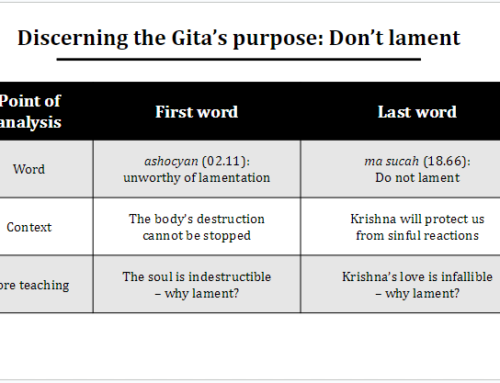A cloak is often used to concealoneself; an armor, to protect oneself. When we use our religion as a cloak, we hide our weaknesses under a religious garb.
In the Gita’s first chapter, Arjuna gave in to his weaknesses and used religion to cloak his decision to abandon his duty. [Of course, Arjuna is an eternal associate of the Lord; his apparent misconceptions are arranged by Krishna to instruct us.] Krishna began his instructions in the Bhagavad-gita (02.11) with a penetrating expose of Arjuna’s fallacious reasoning. Thereafter, Krishna offered Arjuna a far more uplifting alternative: persevering on the path of duty and integrity in spite of one’s weaknesses. By accepting this alternative, Arjuna acted not just honorably but also gloriously, thereby using religion as an armor.
A similar empowering switch from cloak-to-armor is possible for all of us. When we use religion as a cloak, we may misapply the principles of religion to rationalize our shortcomings: “Because I am chanting, it doesn’t matter if I am insensitive to others.” We may even assume a façade of moral superiority: “I am so detached that I don’t care for the emotions of others.”
Gita wisdom helps us make the cloak-to-armor shift by:
Careful understanding: “Because I am not my body or my mind, my normally insensitive nature is not my actual nature. As a soul, I am a warm and caring individual capable of expressing Krishna’s loving nature.”
Determined application: “Because I am chanting, I can get the strength to break free from my material nature and act according to my spiritual nature.”
By thus using Gita wisdom as an armor, we can shield our weaknesses, thereby ensuring that they don’t divert or slow us in our devotional journey towards Krishna.
Bhagavad Gita Chapter 02 Text 11
“The Supreme Personality of Godhead said: While speaking learned words, you are mourning for what is not worthy of grief. Those who are wise lament neither for the living nor for the dead.”


Leave A Comment